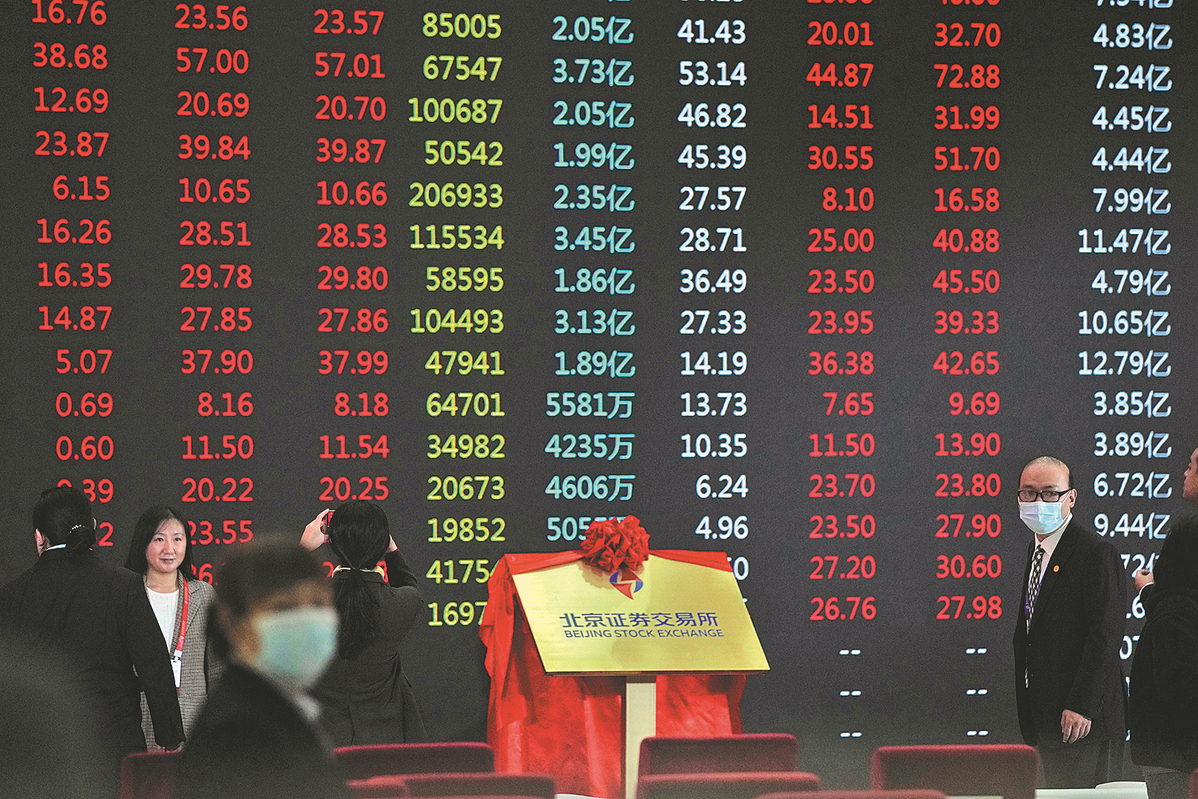New bourse in the market for innovation


Major indicator
According to analysts Shenwan Hongyuan, in addition to attracting more capital, the participation of mutual funds indicates additional in-depth and extensive research, which will help interest more quality companies in floating on the BSE.
The quick action taken by mutual funds targeting the BSE also reflects institutionalization of the A-share market, which is a major indicator of its increasing maturity, Shenwan Hongyuan added.
A record set last year is evidence of the A-share market's continued institutionalization. A total of 1,432 funds were established in 2020, raising an unprecedented 3.2 trillion yuan combined. More than 1.19 billion effective mutual fund accounts had been opened by June, while equity funds have released a total of 3.3 trillion yuan in dividends to investors.
Yi, from the CSRC, said these statistics show individual investors' increasing trust in mutual funds, adding that such funds are playing an increasingly bigger role in the A-share market.
Janice Hu, China CEO at global financial services provider Credit Suisse, said the institutionalization of the Chinese capital market is an irreversible trend, with institutional investors now accounting for 20 percent of the daily trading volume on the A-share market, a figure that could not have been imagined 15 years ago.
According to industry experts, the participation of mutual funds at the BSE is just a small part of the maturing Chinese capital market at the rear of the financial industrial chain. The wider presence of venture capital and private equity players at the front end of the chain will result in the BSE's maturity helping to build a multilevel Chinese capital market.
Shenwan Hongyuan said exemption from income tax in BSE trading will facilitate such players' investment in NEEQ companies and help their invested companies go public on the Beijing exchange. The quality of the bourse will thus improve, a trend that will become increasingly apparent in the second half of next year.
Li Zhenhua, a partner with private equity fund management platform Cloudview Capital, said the BSE's launch is hugely important for venture capital and private equity players in the primary market, investors in the secondary market and those providing refinancing.
A successful exit is usually difficult for primary market investors, Li said. With the launch of the BSE, companies at an early stage of development, or which are on a small scale, are allowed to enter the secondary market. The exit channel for primary market investors is thus expanded and their capital can be used more efficiently. As a result, they will be more willing to invest, reducing the financing difficulties for startups. In this way, a multilevel capital market will be effectively built.
"Setting up different levels or layers is an intrinsic requirement for capital market development and perfection. A well-arranged multilevel capital market can ensure the efficiency of resources allocation. Most mature markets in the world have realized this goal over time," Li added.
Central regulators have been determined to set up a multilevel capital market in China, with this goal written into the new Securities Law, which took effect on March 1 last year.
Such an attempt was made in May 2016, with the introduction of the innovation tier to the NEEQ. Statistics show that since then, the number of institutional investors has risen by 50 percent, with stocks' liquidity improving by 20 percent and companies' valuations rising by up to 30 percent.
Li said companies trading on the innovation tier with increased profitability have gained more investment from private equity players and venture capitalists.
High hopes have been voiced for the BSE rising to become a Chinese version of the Nasdaq. But Wu Xiaoqiu, head of the China Capital Market Research Institute at Renmin University of China, said the Nasdaq is the result of a complete industrial chain. The "richness" of business models at the front end of the financial industrial chain has made it possible for the Nasdaq to flourish, Wu said.
"We should pay high attention to the development of angel funds, venture capitalism, private equity and buyout funds-the diversified financial businesses at the front end of the capital market. A lack of diversity in this respect will lead to huge difficulties in nurturing a market like the Nasdaq," he added.
























